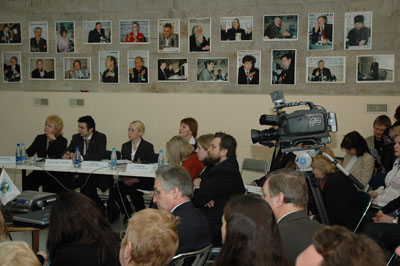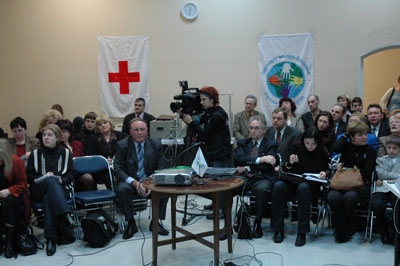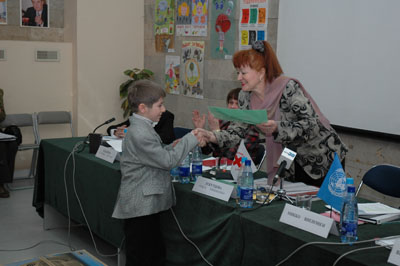-
CELEBRATION OF WORLD TB DAY 2005 IN ETHIOPIA
A half day symposium is organized at the conference hall of the Federal Ministry of Health of Ethiopia to commemorate the 2005 World TB Day. Click here for full details.
-
The Namibian (Windhoek) : 38 Namibians Infected With Tuberculosis Daily
Posted to the web March 31, 2005
By Christof Maletsky
Windhoek
THIRTY-EIGHT people get TB each day in Namibia while at least one out of 11 die during treatment.
The statistics were revealed by the new Health Minister, Richard Kamwi, when he launched the first five-year strategic plan for fighting TB yesterday.
The ceremony also marked the official commemoration of World TB Day.
Namibia did not have much to celebrate.
Kamwi described the dual infection of TB and HIV as an "emerging crisis" in the country and said it was time that policy makers were sensitised to the threat.
He said the dual infection of TB and HIV threatened to seriously undermine the gains that have been made in the last 10 years.
TB is often the first disease to develop in HIV-infected persons when their immunity wanes, and is also the main cause of death in people living with HIV.
Some 45 per cent of Namibia's TB patients were found to be HIV positive when a survey was done in 1998.
"The Ministry of Health and Social Services has, since Independence, done what is possible to treat and educate the nation on TB.
However, with time we also realised that the situation calls for a better response than has been the case so far," Kamwi said.
The Global Tuberculosis Control report for 2005 says global TB prevalence has declined by more than 20 per cent since 1990 and incidence rates are now falling or stable in five of the six regions of the world.
The glaring exception is Africa, where TB incidence rates have tripled since 1990 in countries with a high HIV prevalence and are still rising across the continent at a rate of three to four per cent annually.
"Evidence in this report provides real optimism that TB is beatable, but it is also a clear warning," said WHO Director General Dr Jong-wook Lee in the foreword of the report.
"As Nelson Mandela has said, we can't fight AIDS unless we do much more to fight TB, and it is time to match his words with urgent action in Africa on the two epidemics together," he said.
Although Namibia has achieved 100 per cent coverage in the Directly Observed Treatment Short course (or DOTS) strategy since 2000, the case notification rate remains high and the treatment success rate has been lingering between 65 per cent and 70 per cent for the last eight years.
The World Health Organisation has set a target of 85 per cent.
Under the DOTS strategy, a person diagnosed with TB has to take medication every day for six months.
For those who do not, TB can be deadly.
One person can infect up to 15 others.
The five-year strategic plan launched yesterday will help Namibia achieve the international goals set by the World Health Organisation, "provided that adequate human and financial resources become available".
The Ministry's budget for the five-year programme is estimated at around N$274 million, with a further N$254 million expected to be raised from donors.
Copyright © 2005 The Namibian. All rights reserved. Distributed by AllAfrica Global Media (allAfrica.com). -
CAMBODIA
The CAMBODIAN PRESS HEADLINES
-
Cambodia Sin Chew Daily
Mam Bun Heng [secretary of state of Ministry of Health]: Tuberculosis treatment recovery rate reaches 85 percent. Majority of patients are the poor.
-
Jian Hua
WHO [World Health Organization] offers US$40,000 to educate bird flu issue to Cambodians.
The prevention of tuberculosis result is so significant, 60 percent of patients can be treated over 85 percent, majority of patients are the poor./p>
-
Kampuchea Thmey
WHO admires Cambodia in fighting against TB./p>
-
Kampuchea Thngay Nis
World Health Organization donates US$40,000 to Cambodian Ministry of Health.
Ministry of Health urges to find new tuberculosis rate in purpose to reduce poverty.
A factory pollutes environment and affects people's health.
-
The Commercial News
UNDP advisor leads women's group to inspect in Siem Reap.
Tuberculosis work gets excellent result. Using regular time schedule for treatment, recover rate hit 85 percent.
-
-
RUSSIA
As follow-up on the work done as part of the World TB Day activities carried out by the WHO TB Control Programme in the Russian Federation, it is our pleasure to let you know about the key events:
- Workshop "Introduction into Advocacy, Communication and Social Mobilization", for CIS countries initiated by WHO/HQ 14-16 March, Moscow. Russia was represented by the delegates from the Ministry of Health and Social Development, Federal Service for Surveillance in the Sphere of Consumer Rights and Human Well-Being, leading TB research institutes Russian Red Cross and Federal Service for Sentence Execution.
- Press conference - 23 March, the Central House of Journalists 12:00. Academician Perelman announced the winners of the competition for journalists "Every Breath Counts - Stop TB Now!" 2004 that started a year ago. 94 journalists from national and regional media submitted their publications, video- and audio materials. New competition was announced under the slogan "A World Free of TB Depends on You!".
- Charity concert with the award ceremony - 19 March, the Central House of Journalists, 18:00 - the charity concert followed the award ceremony for the winners of the competition for journalists (six winning entries and five diploma holders).
- TV coverage: interview for the RTR (second TV channel), country-wide, 30 min
- Radio coverage: live broadcast on BBC, Russia.
- Conference on TB-related issues for young researchers on 24 March 2004.
- Contest for the best TB poster among children and school students. A ten-year old boy from Dagestan got the prize for the best TB-related poster at the press conference 23 March.
The TB Control Programme plans publishing a brochure with the collection of the best entries submitted for the competition for journalists in 2004 and best TB posters.
As part of media initiatives, the Programme schedules the workshop for journalists to be co-organized together with the National Union of Journalists.
Attached you will find selected visual evidence to the events above.







WHO Global TB Control report
The 2005 report is embargoed for 00:01 GMT on 24 March and will be posted at that time.
WHO Global TB Control report
Press and Media
For information about global press events, and information products for press including B-roll and interviews with TB experts and activists.
Press/Media
News Coverage
Interviews of experts
WTBD 2005 Events
Read about activities that are happening around the world for World TB Day.
Global WTBD 2005 Events
WTBD Archive
View the past World TB Day websites.
Past World TB Day sites
Stop TB Logo
Our logo usage guide and logo files have been posted online for use by our Partners. Before any materials are reproduced with Stop TB Partnership branding you must request permission from stoptbadvocacy@who.int.
Logo Usage
Contact Information
A list of contacts for all your WTBD related inquiries.
WTBD 2005 Contacts
Stop TB Partners
The Stop TB Partnership is comprised of many partners working together to fight tuberculosis.
Partners' Directory
Become a partner
Stop TB Mailing List
Subscribe to the Stop TB Partnership mailing list to receive updates on information from the Stop TB Partnership, its Working Groups, and its Partners.
Subscribe to the mailing list
Communication Archive
Fact Sheets on TB/HIV
Information and answers on TB/HIV
Facts at a glance
Frequently asked questions
